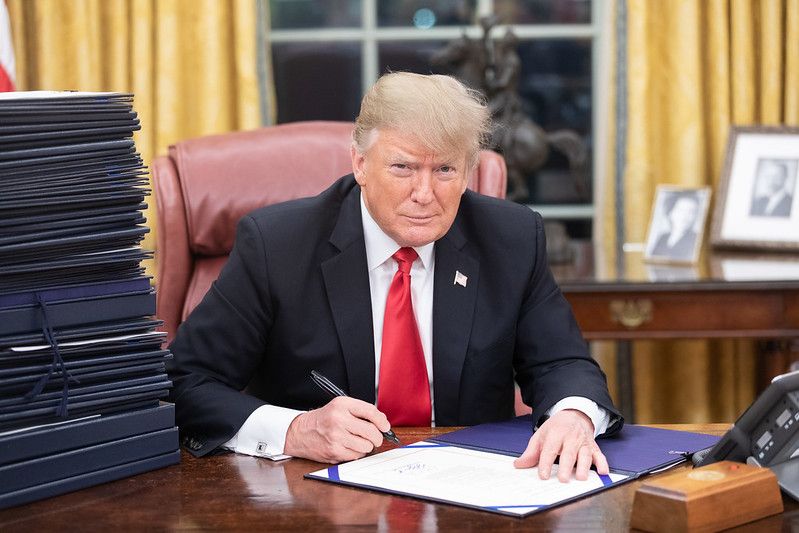WeChat spat puts security of Chinese-Americans and immigrants on the line

This story was first published in The Parallax View newsletter on Sept. 28, 2020. Subscribe for free here.
In the span of three days last weekend, the most important communication app of the Chinese diaspora was banned in the United States by President Trump, then unbanned by federal courts. And on September 24, the Justice Department formally asked the courts to put its ruling against them on hold.
At the heart of the controversy over Trump’s attempt to block the China-based WeChat is the frightening loss of the ability to communicate with far-away loved ones. While a theme in Crazy Rich Asians may suggest otherwise, most people want to stay connected with their families, even from halfway around the world.
On the morning of Friday, September 18, President Donald Trump issued an unprecedented order demanding that United States-based app stores remove WeChat and halt WeChat updates to existing users by 11:59 p.m. two days later. For anyone but experts who follow Trump’s ”tsunami of untruths,” and his praise of China’s authoritarian leader Xi Jinping, his attempt to ban WeChat might have seemed unlikely. Trump has endorsed Chinese authoritarianism, even as the country disputes evidence that it has rounded up members of its Uyghur Muslim minority group in forced-labor concentration camps.
READ MORE ON CHINA AND CYBERSECURITY
How to tell when your government shuts down your Internet access
Why (and how) China is tying social-media behavior to credit scores
China evaluates vulnerabilities for attacks before disclosure
Meet WeChat, the app that’s ‘everything’ in China
Exploring how the Great Firewall of China works
Trump’s tariffs just about killed DefCon #badgelife
Trump officials have argued that WeChat is used by that same Chinese government to harvest the data of its American users, and that there are other apps that United States-based WeChat users can use to stay in touch with friends and family in China. How WeChat’s alleged spying on its U.S. users differs from known U.S. government surveillance of U.S. citizens is unclear.
A group of WeChat users sued on First Amendment grounds to block the order. U.S. Magistrate Judge Laurel Beeler of the U.S. District Court in Northern California heard arguments on Saturday, and on Sunday morning, she blocked Trump’s order and agreed with the WeChat users: The order would violate their freedom of speech, and Trump had not proven to her satisfaction that WeChat posed a sufficient national-security threat.
On the contrary, banning WeChat would pose a threat to its estimated 19 million daily users in the United States. There’s no easy (or, arguably, ethical) way to force the removal of the app from personal devices on which it has already been installed. A ban on app updates and transactions would leave millions of installations on American WeChat users’ devices exposed to cybersecurity threats because they couldn’t download patches or updates from Apple or Google’s app stores, says Christina Xu, an expert on Chinese Internet culture who has been using and analyzing WeChat’s importance for years.
“WeChat really helps to bridge the gap for folks during the pandemic.”—Michael Liao, director of programs, NICOS Chinese Health Coalition.
“There’s a misunderstanding in the tech world that the appeal of WeChat is that it’s a super-app,” she says. WeChat functions as email, Facebook, WhatsApp, news reader, taxi-hailing service, and payment system rolled into one.
“In China, that’s part of the perk. But the killer feature is that people use it to talk to their families and people they know” around the world. So much so, and to the exclusion of all other apps, that many in the Chinese diaspora don’t know, and might have never known, the phone numbers of their relatives in China. They’re using only WeChat to stay in touch.
It’s also a critical community outreach tool for health and social workers, says Michael Liao, the director of programs for the NICOS Chinese Health Coalition in San Francisco.
“Most of our clients, who are in their 50s and 60s, have come from WeChat. Our clients struggle with Zoom, with everything, but not with WeChat,” he says. He also stresses that WeChat, more than Chinese-language TV stations or websites, has been critical in disseminating information about Covid-19, such as how and why people should wear masks, and where to go for testing, to the Chinese community.
“WeChat really helps to bridge the gap for folks during the pandemic. It would really be a loss” without it, he tells me.
WeChat is hardly an innocent player in this. In an in-depth analysis of WeChat by Citizen Lab and the University of Toronto published in May, researchers concluded that WeChat accounts are “subject to pervasive content surveillance,” no matter where they are registered or who is holding the conversation.
Having communications monitored in this way no doubt has a chilling effect on free speech. But the alternative that the Trump administration is proposing is to simply end that speech, a solution that is more akin to amputation than precise surgery.
For now, WeChat remains up and running in the United States, but community organizers like Liao are worried about how to communicate with clients, as Covid-19 continues to ravage the country, and flu season looms. If a ban is successful, it could create an opportunity for cybercriminals to exploit, which they did when India banned TikTok and distributed a fake TikTok Pro app.
U.S. national-security concerns over China’s cyberprowess are well founded, but lashing out in this manner likely will end up hurting people more than it helps.
